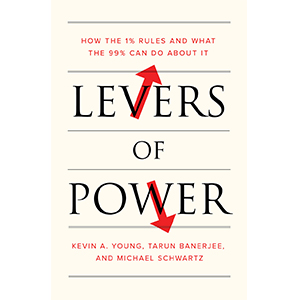Levers of Power: How the 1% Rules and What the 99% Can Do About It
It’s no secret that “the 1%” – the business elite that commands the largest corporations and the connected network of public and private institutions- exercise enormous control over U.S. government. While this control is usually attributed to campaign donations and lobbying, Levers of Power argues that corporate power derives from control over the economic resources on which daily life depends. Government officials must constantly strive to keep capitalists happy, lest they go on “capital strike” – that is, refuse to invest in particular industries or locations, or move their holdings to other countries – and therefore impose material hardship on specific groups or the economy as a whole. For this reason, even politicians who are not dependent on corporations for their electoral success must fend off the interruption of corporate investment.
Levers of Power documents the pervasive power of corporations and other institutions with decision-making control over large pools of capital, particularly the Pentagon. It also shows that the most successful reform movements in recent U.S. history – for workers’ rights, for civil rights, and against imperialist wars – succeeded by directly targeting the corporations and other institutional adversaries that initiated and benefitted from oppressive policies. Though most of today’s social movements focus on elections and politicians, movements of the “99%” are most effective when they inflict direct costs on corporations and their allied institutions. This strategy is also more conducive to building a revolutionary mass movement that can replace current institutions with democratic alternatives.
RM75.00
Out of stock
Description
It’s no secret that “the 1%” – the business elite that commands the largest corporations and the connected network of public and private institutions- exercise enormous control over U.S. government. While this control is usually attributed to campaign donations and lobbying, Levers of Power argues that corporate power derives from control over the economic resources on which daily life depends. Government officials must constantly strive to keep capitalists happy, lest they go on “capital strike” – that is, refuse to invest in particular industries or locations, or move their holdings to other countries – and therefore impose material hardship on specific groups or the economy as a whole. For this reason, even politicians who are not dependent on corporations for their electoral success must fend off the interruption of corporate investment.
Levers of Power documents the pervasive power of corporations and other institutions with decision-making control over large pools of capital, particularly the Pentagon. It also shows that the most successful reform movements in recent U.S. history – for workers’ rights, for civil rights, and against imperialist wars – succeeded by directly targeting the corporations and other institutional adversaries that initiated and benefitted from oppressive policies. Though most of today’s social movements focus on elections and politicians, movements of the “99%” are most effective when they inflict direct costs on corporations and their allied institutions. This strategy is also more conducive to building a revolutionary mass movement that can replace current institutions with democratic alternatives.
Publisher: Verso
Paperback
2020
ISBN: 9781788730969
Related products
-
The History of Development: From Western Origins to Global Faith
The fourth edition of a classic development text,which has both defined and changed its field In The History of Development, Gilbert Rist provides a...RM120.00 -
Trigger Warning: Short Fictions And Disturbances
Global phenomenon and Sunday Times bestselling author Neil Gaiman returns to dazzle, captivate, haunt, and entertain with this third collection of...RM69.90 -
Love in Penang
Penang, with its mix of old world charm and modern bustle, has captured the hearts of many — making it the ideal place for a little bit of romance...RM19.90 -
Three Tang Dynasty Poets
'Can I bear to leave these blue hills' A generous selection from three of the greatest and most enjoyable of Chinese poets Introducing Little...RM6.00






